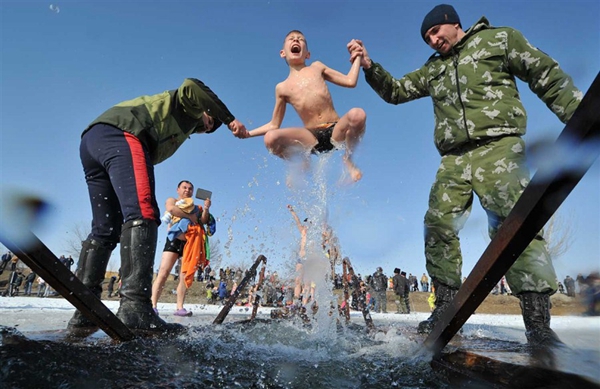
Cossacks
help a boy to take a bath in the icy waters of a lake during the
celebration of the Epiphany holiday near the village of Leninskoe, some
15 kilometers of Bishkek, yesterday. — AFP
Hundred of thousands of Russians braved freezing temperatures to plunge into lakes and rivers yesterday, a wintry tradition observed during the Orthodox celebration of Epiphany.
With emergency vehicles on standby, Muscovites plunged into ice holes across the city starting from midnight to commemorate the baptism of Jesus.
“I’ve been taking the dip since childhood. Even when the Soviet Union still existed, I was already taking the dip and going to the banya (hammam),” said bather Alexei Winns after going into the Ivankovskoye lake in a green area of northwestern Moscow.
“It’s an ancient tradition for me,” said Winns, a Moscow-based filmmaker, shivering in temperatures of about minus 9 degrees Celsius.
“When you’re in a bad mood or when somebody falls ill, you take this water, wash your face with it, or drink it, and you become happier,” said Irina, a municipal official in a fur hat.
Moscow’s emergency officials said more than 93,000 people participated in Epiphany bathing in the capital alone. Authorities had dispatched over 700 rescue workers to the organized bathing spots where people could drink tea to warm up.
An estimated 1.8 million people took part in the ritual throughout the country.
In Russian tradition, Epiphany concludes a holy period called Svyatki, or “holy days,” which starts on Orthodox Christmas on January 7.
The 12 days are filled with various celebrations and rituals in Russia and several other countries in eastern Europe, many of them of pagan and mystical origin, including singing, carolling, and fortune-telling.
